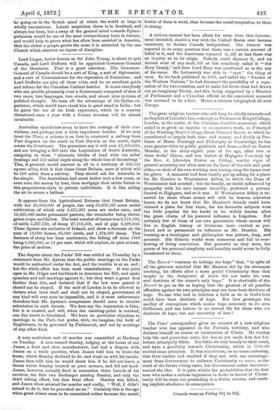The great religious teacher who will long be chiefly remembered
as chaplain of Lincoln's Inn,—though as Professor in King's College, London, as the centre of the Christian Socialist movement which ended in so great an impulse to co-operative work, as Principal of the Working-Men's College, Great Ormond Street, to which he contributed so largely both time and money, and finally as Pro- feasor of Moral Theology and Philosophy at Cambridge, he has even greater titles to public gratitude and fame,—died on Easter Monday, in the sixty-eighth year of his age, after two or three weeks' illness, and was buried at Highgate Cemetery by the Rev. J. Llewelyn Davies on Friday, amidst signs of general mourning not often seen on the faces of the rich and poor alike,—a choir of his own working men having sung the hymn over his grave. A memorial had been hastily got up asking for a place for Mr. Maurice in Westminster Abbey, to which the Dean of Westminster had acceded ; but the family, no doubt influenced by sympathy with his own intense humility, preferred a private funeral at Highgate, and so it was. If Westminster Abbey is re- served for those whose names will still be famous centuries hence, we do not know that Mr. Maurice's friends could have claimed a place for him there, for his favourite subjects were too little popular for his books to be widely known after the great charm of his personal influence is forgotten. But certainly few of those of our own generation whose names will live in English history or literature have exerted so pro- found and so permanent an influence as Mr. Maurice. His learning as a theologian and philosopher was patient, deep, and accurate. His didactic works were numerous and full to over- flowing of living conviction. But powerful as they were, the power of his personal simplicity and humility could never be fully transferred to them.


































 Previous page
Previous page